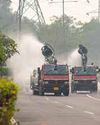Exposure to Extreme Heat and Cold Temperature Leading to Additional Preventable Deaths in India
TerraGreen
|May 2025
The authors of a new 19-year study are calling for immediate measures to curb the growing death toll from extreme temperatures in India. Over the past two decades, heatstroke has caused around 20,000 deaths, while exposure to cold has resulted in an additional 15,000 fatalities.
-

Urgent action must be taken to reduce the ever-rising number of people killed by extreme temperatures in India, say the authors of a new 19-year study which found that 20,000 people died from heatstroke in the last two decades. Cold exposure claimed another 15,000 lives. Findings published today in the peer-reviewed journal Temperature, also revealed that deaths from heatstroke are more common in men of working age and identified the states that are hotspots for deaths from heatstroke and from hypothermia and other conditions fuelled by the coldThere is an upward moving, increasing trend in terms of mortality due to heatstroke and exposure to cold in India, with glaring variation across states. “Deaths due to heatstroke are more significant, compared to deaths due to cold exposure, albeit recording an upward trend," says the study's lead author Professor Pradeep Guin, whose research at the O P Jindal Global University (JGU), in Sonipat, India, is at the intersection of climate change, environment, health, politics, and governance.
Hundreds of people die from the heat or cold each year in India and many of these deaths are avoidable. Last year, Mungeshpur, in Delhi, recorded highest-ever summer temperature in India, at 52.9°C (126.1°F). Every summer, in India, we hear about heat-related deaths, which is avoidable. Similarly, some parts of the country—not the traditionally colder states—report deaths due to cold waves, which can be controlled. However, there needs to be adequate infrastructural and social safety-net support, the authors state.
“With an intense heatwave forecast to hit most of the country this summer and extreme weather events becoming more frequent around the globe as the world warms, there is no time to be lost in raising awareness about the dangers of extreme temperatures and putting in place measures to reduce their impact. “Support systems exist, but more needs to be done,” Professor Guin adds.
Cette histoire est tirée de l'édition May 2025 de TerraGreen.
Abonnez-vous à Magzter GOLD pour accéder à des milliers d'histoires premium sélectionnées et à plus de 9 000 magazines et journaux.
Déjà abonné ? Se connecter
PLUS D'HISTOIRES DE TerraGreen

TerraGreen
Pollution Rises in Bengaluru Lakes Post Monsoon: Study
A new lake health study, covering three major water bodies in Bengaluru-Ulsoor, Doddabommasandra and Shivapura-has revealed dangerous levels of pollution and a clear link between rapid urbanization and deteriorating water quality.
1 min
November 2025

TerraGreen
Seven-month Fishing Ban Along Three River Mouths in Odisha for Olive Ridley Nesting
In a bid to ensure safe and harmonious mass nesting of Olive Ridley turtles, Odisha has imposed a seven-month fishing ban from November, 2025 to May 31, 2026 at three river mouths along the coastline.
1 min
November 2025

TerraGreen
A New Track Record
Formula 1, long defined by speed, spectacle, and cutting-edge engineering, is now racing towards a different kind of victory—sustainability.
4 mins
November 2025

TerraGreen
Extreme Floods are Slashing Global Rice Yields Faster than Expected
WMO Report Highlights Increasingly Erratic Water Cycle
3 mins
November 2025

TerraGreen
Renewable Energy Adoption and Corporate Sustainability
Future of Responsible Enterprise
5 mins
November 2025

TerraGreen
Nature-based Solutions for Delhi's Pollution Crisis
Delhi's annual struggle with toxic air has become an unfortunate ritual. Each winter, the Air Quality Index (AQI) spikes to hazardous levels often above 300, amid school shut downs, masks returning, and public outrage-only to fade until the next smog season.
1 min
November 2025

TerraGreen
Echoes of Love
Why the Forest Can't Live Without Its Hornbills
4 mins
November 2025

TerraGreen
Your Pumpkin Might Be Hiding a Toxic Secret
Pumpkins, squash, zucchini, and other members of the gourd family have a surprising trait-they can take up pollutants from the soil and store them in their edible parts.
1 min
November 2025

TerraGreen
Forests on the Fence
Can Uttarakhand's Van Panchayats Take Root Again?
6 mins
November 2025

TerraGreen
Sacred Tank, Sinking City The Urban Threat to 'Mini-Kashi'
Nestled amid the urban sprawl of Malabar Hill, Mumbai's Banganga Tank stands as a living relic where myth, memory, and modernity intersect.
4 mins
November 2025
Listen
Translate
Change font size

